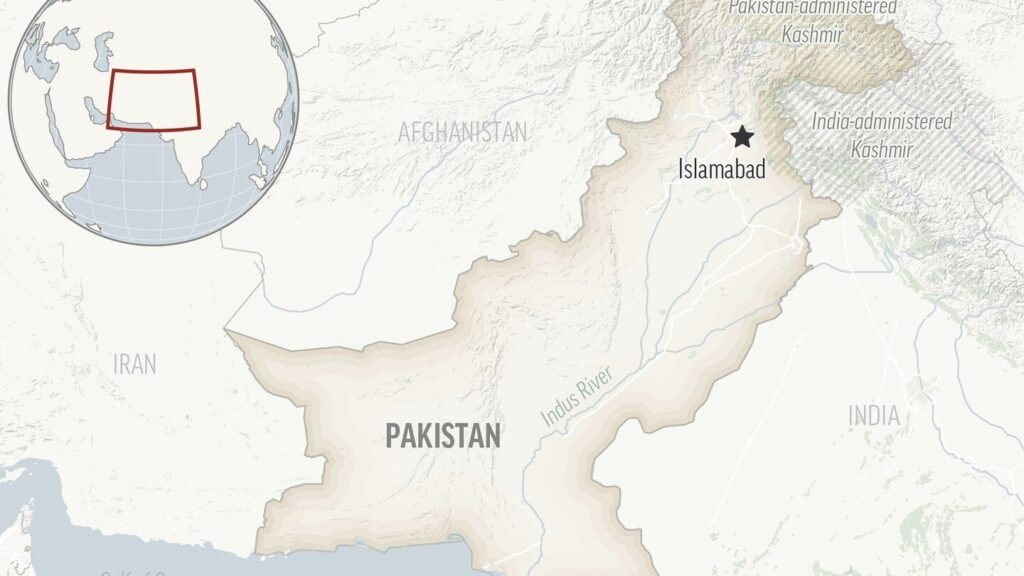ISLAMABAD (news agencies) — Pakistan on Wednesday condemned Iran for launching airstrikes the previous day that Tehran claimed targeted bases for a militant Sunni separatist group. Islamabad angrily denounced the attack as a “blatant violation” of its airspace and said it killed two children.
Tuesday’s strike on Pakistan’s restive southwestern Baluchistan province imperiled diplomatic relations between the two neighbors, but both sides appeared wary of provoking the other. Iran and nuclear-armed Pakistan have long regarded each other with suspicion over militant attacks.
The attack also threatened to further ignite violence in a Middle East unsettled by Israel’s ongoing war on Hamas in the Gaza Strip. Iran launched strikes late Monday in Iraq and Syria over an Islamic State-claimed suicide bombing that killed over 90 people earlier this month.
In state media reports, which were later withdrawn without explanation, Iran said its paramilitary Revolutionary Guard targeted bases for the militant group Jaish al-Adl, or the “Army of Justice.” The group, which seeks an independent Baluchistan and has spread across Afghanistan, Iran and Pakistan, acknowledged the assault in a statement shared online.
Six bomb-carrying drones and rockets struck homes that the militants claim housed children and wives of their fighters. Jaish al-Adl said the attack killed two children and wounded two women and a teenage girl.
Videos shared by the Baluch activist group HalVash, purportedly from the site, showed a burning building and two charred, small corpses.
A Pakistani intelligence report said the two children killed were a 6-year-old girl and an 11-month old boy. Three women were injured, aged between 28 and 35. The report also said three or four drones were fired from the Iranian side, hitting a mosque and other buildings, including a house.
Pakistan’s Foreign Ministry said it issued a strong protest late Tuesday with Iran’s Foreign Ministry, and summoned an Iranian diplomat in Islamabad “to convey our strongest condemnation of this blatant violation of Pakistan’s sovereignty.”
“The responsibility for the consequences will lie squarely with Iran,” it said.
Jan Achakzai, a spokesperson for the Baluchistan province, also condemned the attack.
“Pakistan has always sought cooperation from all the countries of region — including Iran — to combat terrorism,” “This is unacceptable and Pakistan has a right to respond to any aggression committed against its sovereignty.”
A senior Pakistani security official, speaking to media on condition of anonymity as he was not authorized to talk to reporters, said Iran had shared no information prior to the strike. He said Pakistan reserved the right to respond at a time and place of the country’s choosing and such a strike would be measured and in line with public expectations.
“The dangerous precedent set by Iran is destabilizing and has reciprocal implications,” the official said.
However, there were signs Pakistan was trying to contain any anger over the strike. The country’s typically outspoken and nationalistic media covered the attack Wednesday with unusual restraint.
Iranian state media meanwhile continued not to address the strikes, instead discussing a joint navel drill held by Pakistan and the Iranian navy in the Persian Gulf on Tuesday. Pakistani officials acknowledged the drill, but said it came earlier than Iran’s strikes.
Pakistani defense analyst Syed Muhammad Ali said the government would weigh any potential retaliation carefully.
The country’s air defense and missile systems are primarily deployed along the eastern border to respond to potential threats from India. But it might consider taking some measures to respond to such strikes from its western border with Afghanistan and Iran, Ali said.
Jaish al-Adl was founded in 2012, and Iranian officials believe it largely operates in Pakistan. The group has claimed bombings and kidnapped members of Iran’s border police in the past. In December, suspected Jaish al-Adl members killed 11 people and wounded eight others in a nighttime attack on a police station in southeastern Iran. Another recent attack killed another police officer in the area.
In 2019, Jaish al-Adl claimed responsibility for a suicide bombing targeting a bus that killed 27 members of Iran’s paramilitary Revolutionary Guard.
Iran has suspected that Sunni-majority Pakistan is hosting insurgents, possibly at the behest of its regional arch-rival Saudi Arabia. However, Iran and Saudi Arabia reached a Chinese-mediated détente last March, easing tensions. Pakistan, meanwhile, has blamed Iran in the past over militant attacks targeting its security forces.


